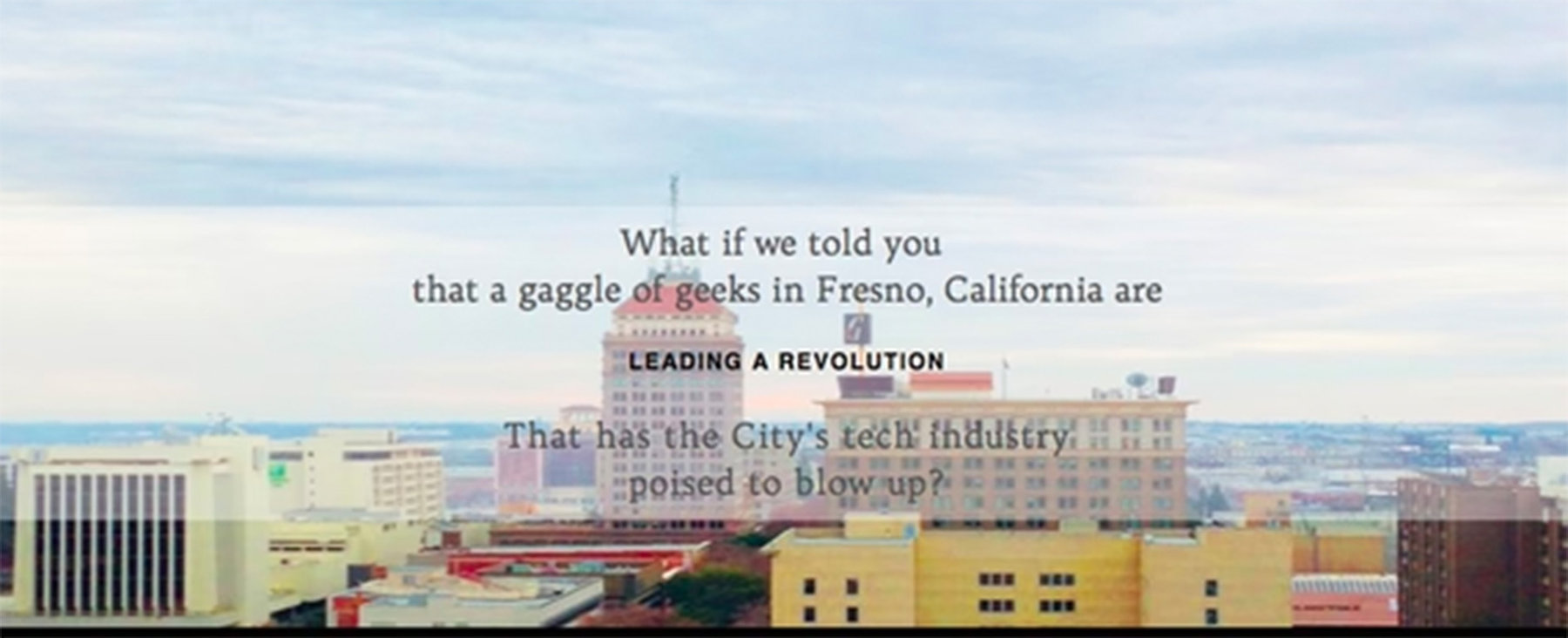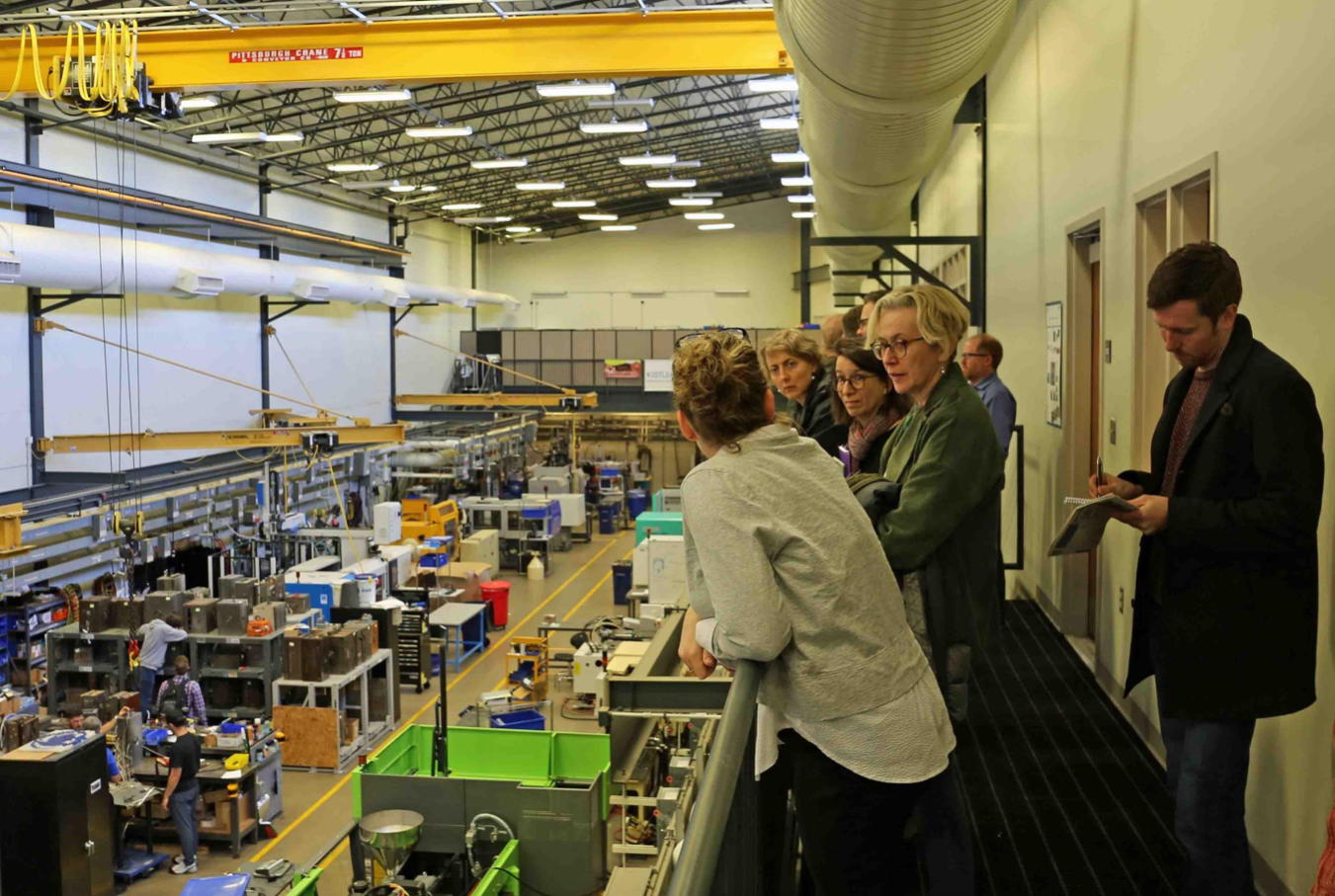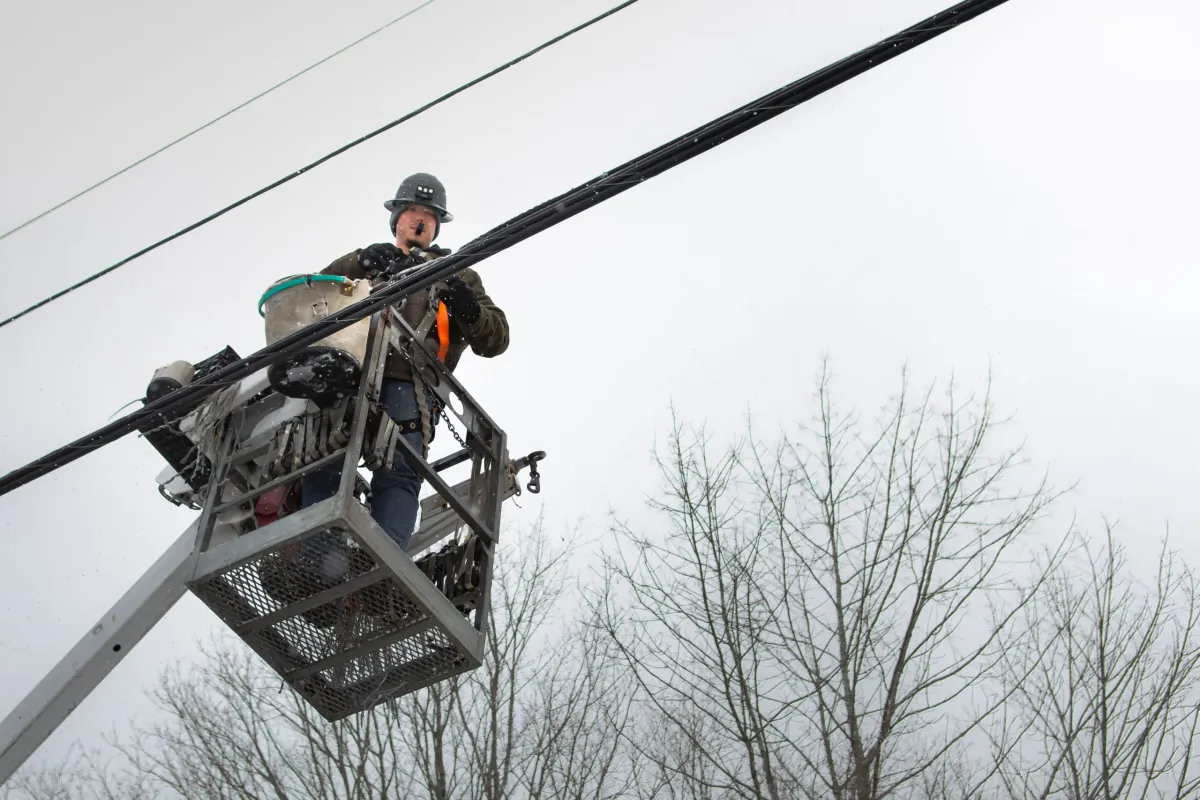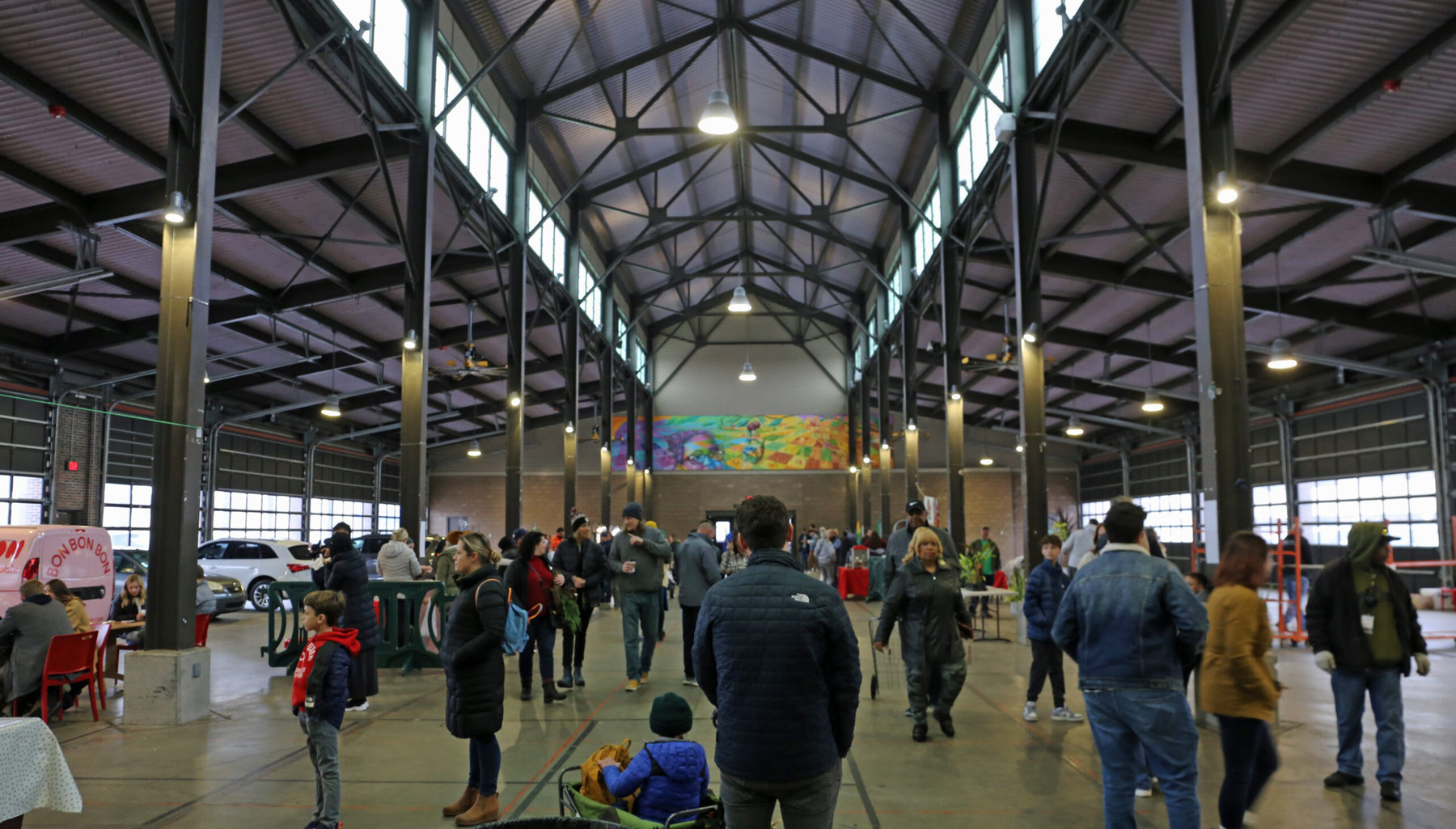Earlier this week I mentioned a tech company in the Mural District of Fresno’s tattered-but-struggling-to-recover downtown called Bitwise Industries. It’s a company we first visited one year ago and have followed ever since. In this and a subsequent post or two, I’d like to say something about the ways in which Bitwise’s story sheds light on conditions distinctive to Fresno and its surrounding, hard-pressed Central Valley of California, but also about the ways in which it reflects trends we’ve seen in every corner of the country.
First, the similarities. In its basic setup, parts of the Bitwise approach resemble tech-promotion and startup efforts we’ve seen elsewhere in non-major-metropolis America. Those others include: a software school called The Iron Yard in Greenville, South Carolina, which I wrote about last year—and its parent incubator, called NEXT. Or the Bridgeworks Enterprise Center in Allentown, Pennsylvania, which John Tierney wrote about last fall. Or, with a different emphasis, the Community and Economic Development Office in Burlington, Vermont. Plus others in larger cities like Sioux Falls, South Dakota, Pittsburgh, Pennsylvania, and Columbus, Ohio. I will tell you, the more you see of this activity, the more you think of the majority of America actively trying to position itself for new economic realities, rather than just being pushed around.
Bitwise is a “normal” tech-promoting effort in those ways. Jake Soberal, its co-founder and CEO, says he doesn’t like the term “incubator,” since many of the businesses he works with are already well established. Still, for descriptive convenience the company’s efforts resemble those of incubators elsewhere.
But in at least three ways I think Bitwise is interestingly illustrative of its city and region. I’ll talk about one of them today: what is involved in trying to create a tech economy, with the high-wage jobs and spinoff business stimulation that presumably means, in a place far removed from the dominant tech centers of the East and West Coasts. (For a previous treatment of this theme in another non-coastal part of California, see this dispatch.) We’ll get to the next two—how the company is involved trying to prepare a low-skill, low-wage, high-unemployment local workforce for better tech opportunities, and how it is engaged in the future of the city itself—in follow-on reports.
First, some background: what Bitwise is, and what it’s trying to do.

The co-founders of Bitwise, Jake Soberal and Irma Olguin Jr., describe their organization as the “Mothership of Technology” in the Fresno region. In practice that means that their parent organization combines several of the start-up functions sometimes dispersed among different groups.
The company’s HashtagFresno component offers low-cost ($39 per month), tech-equipped workspaces for individuals or small teams. Its Geekwise Academy is a coding and tech-skills school, which is developing an intriguing range of specialized programs. Its Shift3 Technologies does contract tech projects for firms in the region and elsewhere, employing local developers, designers, and marketers. And its headquarters building in the Mural District contains separate offices for more than two dozen tech firms.

Later this year the company will open a new, much larger office-and-classroom space in a long-vacant building it is remodeling in Fresno’s historic downtown. (That building will also house a lab for the innovative CART school that Deb Fallows has written about.) Soberal said that some 40 tech companies will be housed there, along with more work spaces, classrooms, officers for lawyers or accountants or other allied professionals, et cetera. A Fresno Bee story on the expansion is here. (Note that the Bee has a metered paywall.)

I asked Jake Soberal on this latest visit, as I had earlier on, what he thought could be the business base for a tech economy that was 3+ hours’ drive from either Los Angeles or San Francisco (sadly, High-Speed Rail does not yet exist) and thus would lack all the place-based advantages that came automatically to firms in SF, Boston, or New York. How could he fight the trend toward the concentration of national and global talent in a handful of hyper-expensive but also hyper-productive big centers?
To boil a long discussion down to two main points, his first argument was that the global centers and the regional ones could prosper together—the latter using their advantage of such dramatically lower operating costs. (Note for future article: In about six or eight big U.S. metro areas, life is ever-shaped by the unavoidable, unbelievable cost of real estate. Since these are the areas that dominate our media, entertainment, and politics, that’s cast as an overall American predicament too. But it is not, at least not in most of the places we’ve been.)
“The per-person total cost of a very happy mid-career developer here is $80,000 to $100,000,” Soberal said. “That’s half, or less than half, of the cost in the Bay Area” or other big tech centers. “If we can get a critical mass of people here in Fresno who are competent and capable, national and global companies will choose to expand their operations here. The Silicon Valley and Boston and Portland will continue to grow. And so will Fresno—and Des Moines and Wichita. Software and tech have not been a zero-sum game.”

That is what you could think of as the “outsourcing” part of the Bitwise/ Greater Fresno tech vision. Another part was more intriguing to me, in that it matched the observation we’ve heard in the most successful-seeming cities across the country. That is the insistence on “knowing who we really are” in a given city or region, and choosing strategies based on an honest assessment of an area’s advantages and handicaps.
What Fresno really is, is the regional capital of one of the world’s most important agricultural areas. “The economy is global, but significant strengths are local,” Soberal said. “Industries tend to develop in a regional way.” He went on to argue (1) that agriculture involves many of humanity’s most important challenges, starting with sustainability in all its aspects; (2) that agriculture was still relatively behind in apply modern data tools to its operations; and that therefore (3) tech companies in the Central Valley had an opportunity to become the leaders in a field of ever-increasing important.
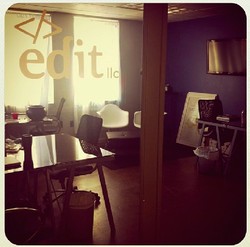
“My guess is that 5 to 10 percent of the tech need of the farming industry is now being met,” he said. As compared to about 900 percent of the financial services industry and four million percent of the online commerce industry. “You could build a technology industry in Fresno based on that alone, not to mention the worldwide need in agriculture.” (For a previous report on high tech in agriculture, see this account by our Marketplace colleagues on our trip to Sioux Falls back in 2013.)
“You think high tech, you don’t think ‘growing food,’ ” Payton told me. “You think Bay Area, self driving cars, devices to make daily life easier. But we’ve got a lot of farmers here with a lot of data they don’t know what to do with. It can make a big difference to collect the data and put it in usable form.”
Will this company pay off? Or others in the Bitwise community? I don’t know. But I cannot help but be impressed by the growth I’ve seen over the past year, and the sense of both mission and community from people involved here.
Upcoming, more about Bitwise as a guide to Fresno’s educational and downtown-development efforts. For now, a last word from Derek Payton, when I asked him about a “realistic, positive ambition” for Fresno in five years’ time.
“A realistic and positive scenario…” he said. “It would be, when you think of tech in California, you’ll think of the Bay Area, L.A., San Diego, and Fresno. There’s definitely strong tech potential here.”
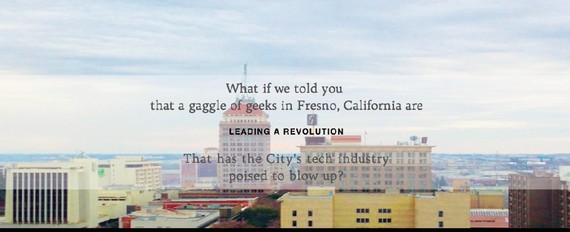
Thanks to Creative Fresno for permission to use their photos of the city’s murals. Here is a link to another project they have underway, and one more about the organization’s goals.

